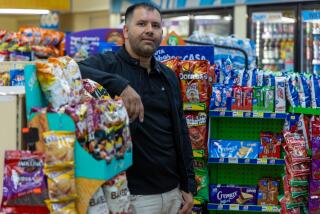Sudanese Refugees Reunite to Plan Future
A group of young African refugees, commonly known as the Lost Boys and Girls of Sudan, have found a way to help one another and revive the solidarity they once shared in their homeland.
Scattered across 39 U.S. cities when they arrived almost four years ago, the 3,900 teenagers and young adults were forced to deal with culture shock and the stress of living apart.
So last year they established the Lost Boys and Girls of Sudan, a not-for-profit organization that seeks to raise money for school tuition and healthcare programs and to reestablish unity among the young refugees.
Over the Memorial Day weekend at the Los Angeles campus of the University of Judaism, a 19-member board of directors convened for the first time to draft the group’s bylaws and formalize its mission.
“This organization has been established to create a network, to bring us together and really help us to establish ourselves in this country,” said Benjamin Okuka, 29, the group’s public relations officer, who lives in Detroit.
It is a goal that few of the young southern Sudanese, now ages 19 to 29, thought they would ever realize.
They fled their native country after their villages were burned and looted by Arab militias from northern Sudan. Most of the young people -- mainly boys -- were unwilling to join rebel fighters in Sudan’s enduring civil war that has pitted forces from the predominantly black African, animist and Christian south against government forces of the dominant Muslim and Arab north.
The young exiles, hundreds of them orphaned, trekked thousands of miles, enduring starvation and banditry, eventually ending up in desolate, fly-infested refugee camps in Kenya. Many of them died.
The U.S. offered almost 4,000 of the Sudanese youngsters a haven in 2001. San Diego, San Jose and Sacramento were among the cities where scores were resettled.
By the time they arrived, most were adults and thus eligible for public assistance for only a limited time. After that, they were on their own -- thrust into a society where modern conveniences such as telephones, washing machines and electric ranges were as foreign to the newcomers as their surroundings.
The breakup of their tight-knit group -- most were used to sharing a hut with five or six others in a compound of more than 300 people -- added to the challenges of assimilation.
“The only support system we had was each other,” said Apuk Ayuel, 24, deputy public relations officer for the Lost Boys and Girls, who lives and attends school in Texas. “To come here and be scattered across the country, you lose that support system. When you are in a core group, motivation comes from interaction.”
Although many of the refugees have earned high school diplomas and some are pursuing higher education, most are struggling to juggle the demands of studying and working full time.
Moses Chol, the group’s chairman, takes undergraduate classes in information technology from 7:45 a.m. to 2:15 p.m. five days a week at the American InterContinental University in Atlanta. His job as a factory warehouse laborer begins at 3 p.m. and stretches past midnight.
“I want to find a part-time job so that I can finish my studies sooner,” said Chol, 27. But that would mean less cash and more hardship.
The new organization hopes to raise funds to provide scholarships to prospective graduates, and it plans to solicit private donations.
“We are the only people of our generation of southern Sudanese that have the opportunity to receive an education,” Ayuel said, adding: “We are establishing our roots here and hope to flourish here.”
“There is power in a collective, unified commitment,” said Nina Lieberman Giladi, dean of the MBA Nonprofit Management Program at the University of Judaism that is helping the Lost Boys and Girls of Sudan get organized. “If everyone was left to their own devices, to identify funds, to get to universities, then generally only the strongest would succeed.”
The group also hopes to raise money for trauma counseling programs, since many of the young people still have nightmares about the horrors they witnessed and endured, Ayuel said, but few have received therapy.
The young people also want to raise awareness about the current plight in their homeland.
A peace accord was signed last year, officially ending 21 years of war.
But in recent months, Arab militias have killed at least 70,000 civilians in Sudan’s western Darfur region and more than 1.6 million have been displaced.
“Our story of the lost boys and girls is a microcosm of what is happening all across Sudan,” Ayuel said, adding: “We want to spread the message to get more people to defend our cause.”
More to Read
Sign up for Essential California
The most important California stories and recommendations in your inbox every morning.
You may occasionally receive promotional content from the Los Angeles Times.











